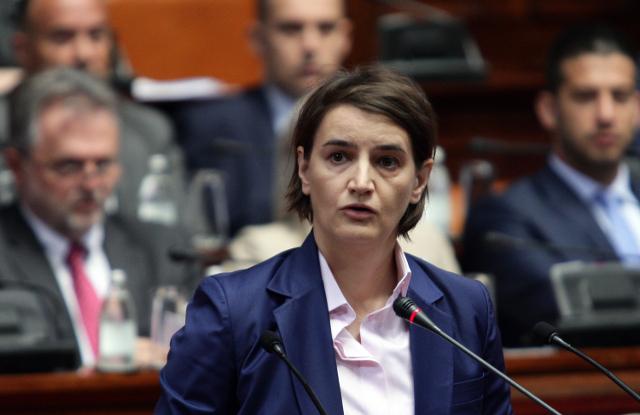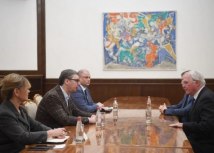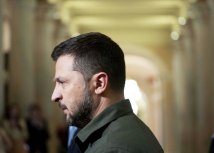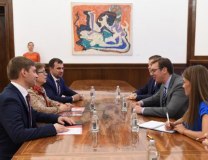Assembly meets to elect govt, Brnabic presents her program
The Serbian National Assembly on Wednesday morning started a session called to elect a new government.
Source: Beta, Vecernje novosti, Tanjug
Prime Minister-designate Ana Brnabic's proposal for the composition of her cabinet arrived in the Assembly on Tuesday, containing 18 ministries and 21 ministers, three of them without portfolio.
Brnabic read out her keynote - the program of her future government - with her main messages focusing on the need to distance Serbia from "a bureaucratic mindset" and the need to catch up with the digital revolution and stop the country's brain drain.
"It is an honor to serve Serbia to make it change for the better. It is important that we agree on the priorities and make a social agreement on what we can and must achieve together for Serbia to become a successful country," Brnabic said.
She also addressed numerous criticisms heard since President Aleksandar Vucic announced she was his pick to as head of government, to say her response was "not to respond."
As for her cabinet, Brnabic said its "vision" would be built on the foundations of the previous one.
The state coffers are in a good conditions, with positive macroeconomic indicators, a budget surplus, and inflation within target values, she said.
She also spoke about the urgency of establishing the Community of Serb Municipalities in the province of Kosovo and Metohija, saying that the goal is to maintain stability in Kosovo, continue negotiations with representatives of the interim administration in Pristina, economically strengthen Serbs there, and continue to support the return of displaced persons.
According to excerpts from the speech published by the government, Brnabic said it was important "to harmonize priorities and reach a social agreement on what we can and have to achieve together in order to bring Serbia among the ranks of successful states."
She underlined that "we must respond to all challenges with courage, resolution and with a clear vision of where we are going."
According to her, bureaucracy is one of the leading problems of society and therefore this government will work to change the existing paradigm and ways of thinking in every segment of society.
With the digital revolution we have a chance to catch up with other countries, because only victorious societies change, Brnabic said and expressed the belief that Serbia is ready to lead the whole region in changes.
She pointed out that, in addition to digitization, education and accelerating economic growth are at the main goals that the new government will work on, noting that in 2016 only, due to the high cost of borrowing in the past, we paid more than €1 billion in interest.
Also, order has been introduced in public finances, which the citizens recognized and bore the greatest burden of austerity, she recalled, and pointed out that these efforts by citizens and the Government of Serbia were recognized by the IMF and the World Bank.
"We have successfully passed through six reviews within the IMF Standby Arrangement, and currently we are undergoing the seventh one. I wish to point out that, at the end of this year, we will successfully complete the three-year Arrangement with the IMF," Brnabic stated.
According to her, this government plans to continue with the rigorous control of money spending.
"Our goal is to have the deficit of the general government below 1% until 2019 which will introduce us among the fiscally most responsible countries. With a further growth of GDP and a low deficit, we plan to bring down the level of public debt below 60% of GDP, which will create space for new jobs," she noted.
This government will continue with economic reforms, with the expectation that the growth of real GDP will be 3.5 percent per year based on the growth of investments, increased exports of goods and services, particularly of goods and services with a high added value, as well as reduced share of public expenditures and the deficit in the current transactions in the GDP.
In order to achieve this, it is necessary to improve business environment, political stability and to continue with the process of accession to the EU, she underlined and added that this also entails the continuation of reform of public administration and a more efficient work of the state, which should be a service for citizens, the PM-designate said.
Brnabic pointed out that public finances are the lifeline of the economic system of any country and with right work we will have an increase of salaries in the public sector, but we will also work to reduce burden on employers.
The deadline to vote in a new government is June 30. At least 126 people's deputies in the 250-seat Assembly must vote in favor for this to happen.











